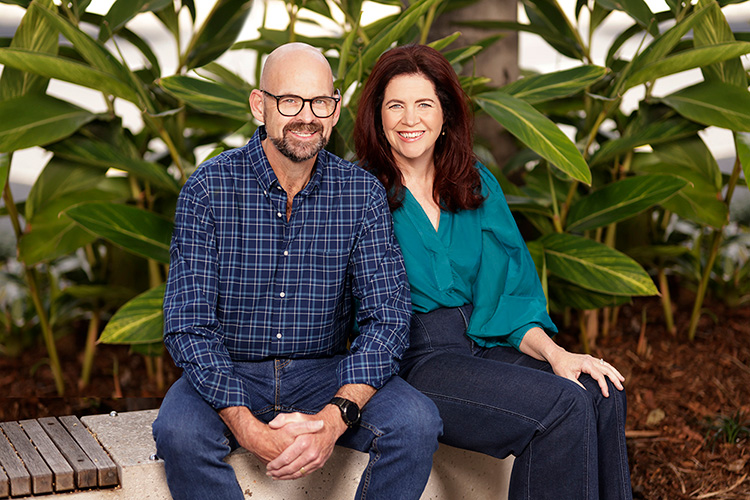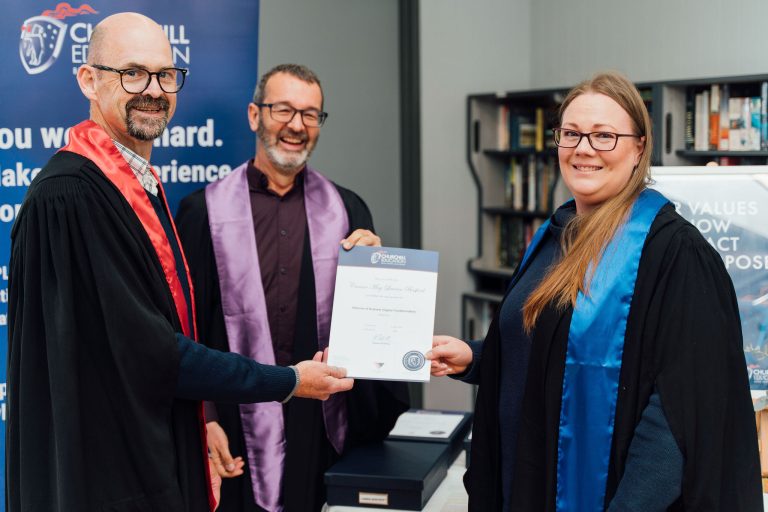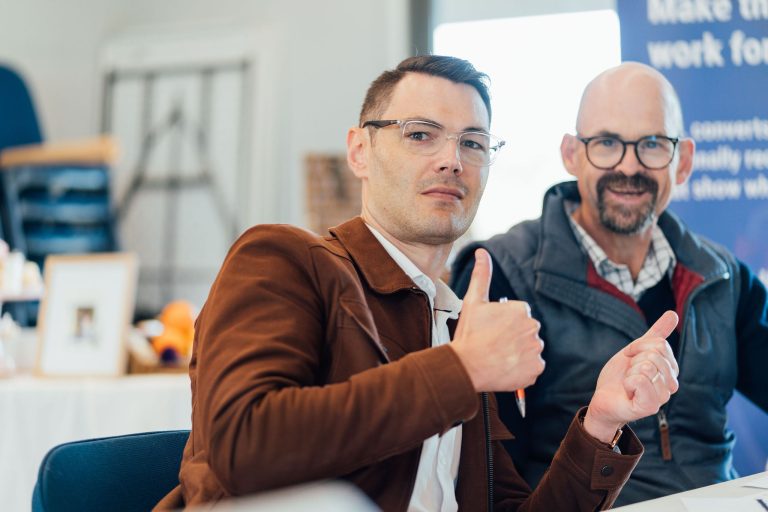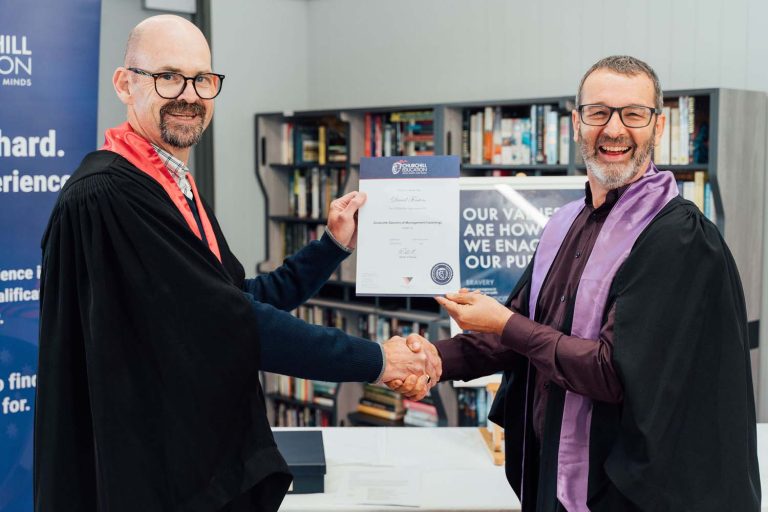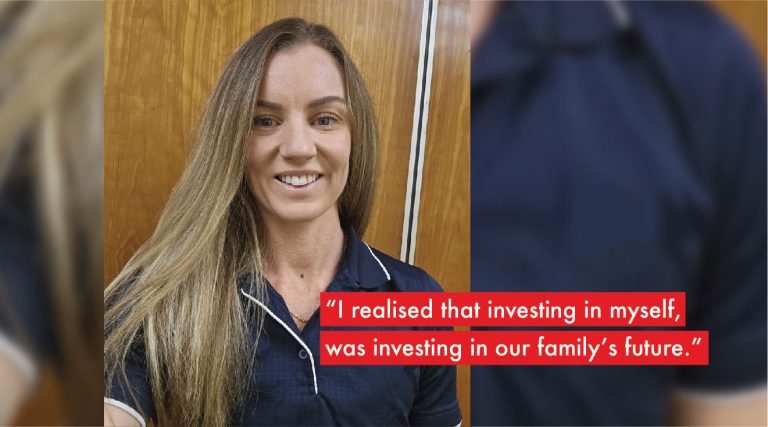Senior investigator, Jason Nelson’s life is a story of complex trauma, stigma, and attempted suicide. But it is also a story of resilience, strength and leadership. 
Jason takes us through his career from the Royal British Navy to senior investigator and undercover operative with WA Police. He discusses the experiences that led him to crisis point (more than once), and being diagnosed first with depression, then anxiety and later PTSD.
He talks about the strength and support of his wife as they went through not only his mental health challenges, but also the attempted suicides of his daughter. And then he talks about the process of opening up, the stigma, the empowerment of going public with his mental health message, and the difference his diplomas awarded through recognition of prior learning have made to his self-confidence and career opportunities.
Listen to Jason’s Interview
Read Interview Transcript
Jason’s Career Journey
Jason spent the first few years of his life in Merseyside, a town on the banks of the Mersey River overlooking Liverpool, UK. His family then emigrated to Adelaide for a few years to join an aunt who had fallen in love with an Aussie and emigrated as a 10-pound pom. His mother was in the end so homesick for her family back in England that they returned home where he finished his secondary education.
After school he joined the Navy – fulfilling a childhood dream to follow in the footsteps of his adored grandfather.
He spent nine years with the Royal Navy as an aircraft technician, seeing active service in the Gulf and in the former Yugoslavia. He was often sent on offshore deployment for up to nine months at a time. If he was shore based, he’d work a shift roster similar to fly in fly out work. Often only being home every second weekend.
When Jason’s first daughter was born, he decided he didn’t want to go away on months of deployments anymore or home only sporadically.
‘I didn’t want to miss those important times – the first words and first steps. I didn’t want to be a weekend dad, essentially.’
He informed the powers that be, but it wasn’t as easy as giving one pay cycle of notice as it is for most civilian jobs. It meant seeing out another 18 months of required service.
Life after Navy….

Initially Jason wanted to stay in engineering, but with a lack of work options he applied for the police and fire service. An opportunity with police came up first so he went through the training program, graduated as dux of his class and was awarded the Baton of Honour, and became an officer for Cheshire Police.
Jason says he thrived. He loved the police work and quickly worked his way up the ranks to detective for the homicide squad and also the drug squad.
Jason says he’d enjoyed reading a lot of true crime books during his time with the Royal Navy and felt he was exactly where he was meant to be. He was arresting criminals and keeping people safe. His work gave him an identity to be proud of, work that challenged him, and it allowed a much better work life balance for his family.
Moving to Australia….
Nine years of police work later, Jason and his family (which included wife Emma and two young daughters) were holidaying in Spain. They both had itchy feet and discussed moving somewhere quieter and safer for the kids to grow up.
He saw an ad for New Zealand police, but Emma had seen a documentary on the Mongrel Mob – a notorious NZ street gang, so her answer was no to that idea!
Find out what you’re eligible for
But then she said, ‘If Australia came up, we’d really think about it.’
Jason did some research and found that various state police services were recruiting. WA Police were offering permanent residency the day they arrived, so that’s what they chose. Emma was on board with the idea and 11 months later they landed in Perth.
Workplace bullying….
When asked how his mental health was at the point of moving to Australia, Jason says,
‘It was amazing. I thought I was invincible. I loved the high-risk stakes of being a police officer. I loved smashing doors in, and locking up criminals, detailed investigations, all that type of stuff.’
On the strength of his years of high-level crime work in the UK, Jason was selected to work in the state intelligence division in a high-risk covert team.
His colleagues resented his quick ascent, and over a six-month period systematically bullied him, constantly setting him up to fail in operational situations.
‘In high risk, covert settings your life is on the line,’ he explains. ‘If you make a mistake your cover is blown.’
Jason didn’t fail, and that just seemed to fan the flames.
‘I was in this perpetual cycle, but I felt I had to stay in it because I was getting paid extra money to be on this team. We were building our house, we were paying rent at the same time. So, I had a mortgage, paying rent. And I didn’t want to let my family down. I put this incredible pressure on myself to be the strong one of the family, to be the provider, and the keystone. And it just caused me to spiral down into this deep, dark depression.
I felt unworthy, useless, and a burden. I’d never experienced anything like that before in my life. I’d never even had a day when I felt down. I’d always been this happy go lucky guy that loved adrenaline sports, football, and my family.’
The black dog comes knocking….
Things got so bad that Jason attempted suicide on multiple occasions. He had managed to keep it covered up, until one day his wife found him after one of those attempts, curled up in a ball at the bottom of the shower.
Jason was caught between what he felt were his obligations to his family and the stigma of the job.
‘It’s a male dominated culture where it’s considered weak to speak up and admit something is wrong. You’re worried that people won’t work with you, you think it’s going to limit your career, you’re going to be seen as soft.’
Emma asked him, ‘What’s more important? Your job or your health?’
Jason describes Emma as an, ‘unwavering force of nature.’
Facing the stigma, opening up….
The next day Jason walked into the office of his superintendent, put his gear on the table, and told her he couldn’t do it anymore.
Not only was he dealing with the opposing forces of family obligation and workplace stress, he had also been fracturing himself into at least four different personalities – the husband and father, the cop, and the undercover identities his investigative work necessitated.
Jason got help and says just the relief of being off that team made him feel a lot better. It was the catalyst for looking for a new job. Jason found a job with The Department of Water and Environmental Regulation in the role of senior investigator. All of his colleagues are ex-cops, so he gets to work with like-minded people, and the clientele he works with are he says, ‘a lot nicer!’
Heart-stopping surgery….
A few more years down the road, Jason had a routine hernia repair operation. Coming out of the anaesthetic he had a panic attack. Something he’d never experienced previously.
His heart went from 50 beats per minute to 160 and kept climbing. His hospital room filled up with medical staff in seconds. They wheeled in the defibrillator and told him they’d have to shock his heart back into a normal rhythm if it didn’t do so of its own accord.
Fortunately, it didn’t come to that, but it took 12 hours for his heart rate to return to a kind of normal. As you can imagine he was exhausted.
They sent him to a cardiologist, but tests did not reveal anything physically wrong with him. So, they put it down to a delayed reaction to the anaesthetic.
What he does know is that it nearly killed him.
And it threw open the doors to a library full of trauma stories that he had been accumulating and pushing to the back of his consciousness.
Jason says it was like reliving every traumatic incident he’d experience in, ‘Dolby surround sound and high definition technicolour.’
Everything triggered him. Smells, noise…. He says he was angry all the time and became hyper vigilant and paranoid. He was having flashbacks during the day and terrors at night. It was a level of anxiety he’d never experienced. He’d been through depression, but not this.
‘I remember one day walking around the supermarket, doing anti-surveillance while pushing a trolley, because I was so paranoid people were following me.’
Trauma stories….
At 16 Jason’s grandfather, who he was very close to, died of brain cancer. It was his first experience of death.
The night before his wedding, during his Buck’s Night one of his closest friends died after he fell from a hotel balcony.
Just after he graduated from the police college his grandmother died. He’d spent time every week of his life with her and they shared a close bond. She had died suddenly of a massive heart attack. He was called to her death as a police officer, not as a grandson.
During his time as a police officer he had also gathered dozens of traumatic incidents – attending autopsies, tragic accidents, death scenes, delivering death messages – knocking on a door to tell someone that their loved one had died.
These had all been dealt with black humour, or a few beers after work. Jason says this was before PTSD was identified as a risk for police officers and first responders.
Breakdown on a train….
On one of Jason’s regular commutes to work he reached tipping point:
‘I remember just breaking down on a busy commuter train. You know, in corporate wear, very packed train, just sobbing my heart out. And I’ll never forget it because no one asked if I needed any help. No one asked what had happened or what was wrong. So, I just got off the train. Got on another train and went to see my doctor straight away.’
He was diagnosed with PTSD.
The diagnosis gave a name to what he was feeling. He was the able to seek help. He saw psychologists, went on medication, and was able to piece himself back together.
He learnt to take better care of himself, returned to work, and had a smooth couple of years. He says he was in such a good place that he was reducing his medication and was down to almost none.
And then his daughter attempted suicide….
Jason’s youngest daughter Holly attempted to take her life twice in the space of three months. She had been depressed and suffered from anxiety. She was bullied at school and was going through body image challenges. Jason and Emma had put it all down to normal teenage hormonal behaviour.
But Jason says, ‘She was in a world of hurt and pain, and we didn’t know how to deal with it.’
After each suicide attempt (by overdose) they ended up in a hospital cubicle in the emergency department for up to four days, waiting to get her a bed in a proper mental health facility.
She was too old for the children’s system, and too young for the adult system. It highlighted a broken system, and a chronic lack of support for adolescents with mental health issues.
Eventually they were able to get Holly the help she needed, and it was a turning point for her.
12 months later Jason and Holly ran the Perth half marathon together for Beyond Blue.
And then they did a speaking gig together. They both shared their stories, and their individual experiences and perspectives. It was a moving experience for both.
Holly is now 21, doing well, and travelling around Europe with her boyfriend.
Going public….
In the process of getting help for Holly, Jason connected with Lyn and Ian Sinclair who started Sirens of Silence – a charity providing support for police officers and first responders.
Jason eventually became the Vice President of Sirens of Silence and began speaking publicly about his experiences with trauma, depression, anxiety and PTSD.
You can watch one of his moving speeches here.
He started studying mental health, so he could help others going through mental health challenges. While he was finishing his studies and starting his public speaking journey, he decided to go public about another trauma story from his library of terrors….
Sexual abuse….
Jason had been sexually assaulted as a 13-year-old by one of the instructors from Sea Cadets. He had felt so ashamed that he had told no one and had locked it away.
He knew it would be difficult to prove given the passage of time. But he wanted the perpetrator to know the pain he had caused, over so many years. At that point Jason had been carrying it around for 32 years.
He made his statement to the police. It was the first time his wife had heard the exact story.
As it turned out the perpetrator was already in prison for a similar offence. He was interviewed in prison about the offences he’d committed against Jason and admitted to them all.
Eventually this resulted in a crown prosecution, and a custodial sentence. It was a great result, but it was a process that took nine months.
In that time Jason was advised not to seek any meaningful treatment or therapy to process the memories. His legal counsel felt he might come across as disingenuous if he appeared desensitised and not an authentic victim.
So, he lived through another nine months if PTSD symptoms. Night terrors, hyper vigilance and mental pain. He self-medicated with alcohol and cannabis, fell into another pit of depression and lost his motivation to exercise, which became a dangerous feedback loop, sending him further down the spiral.
It was a gradual slide, and he did his best to hide his mental state and substance abuse from Emma. But internally he was in a world of pain and had been contemplating suicide for weeks.
End of the rope….
One morning Jason told Emma he was going out for a walk and needed to clear his head. He told her he loved her, walked to the beach, and tried to drown himself.
In between attempts he phoned Brendan.
Jason had been Brendan’s peer support when he had been struggling with his own PTSD. They’d been meeting regularly, sharing their experiences.
You can read Brendan’s story here.
Jason doesn’t have much recollection of the phone call. He thinks he called him for validation, not for permission or help. Brendan, also a police officer, was on duty that day. He sent a police patrol to intervene.
The police officers took Jason to hospital where he spent two weeks recovering. He withdrew from alcohol, detoxed, and talked – a lot. He says it was the best two weeks of his life.
‘I had such an amazing team around me. The psychiatrists, two psychologists, a social worker, a welfare officer, all the nursing staff. I had an alcohol and drug nurse, a pharmacist, who would come in and explain what medications were, rather than just, “here’s a tablet,” and the group work. And while I was there, I got to rediscover my love for art and writing.’
Jason credits Brendan with saving his life. But Brendan says he saved his own life by calling him.
Throughout all this Jason’s employer was very supportive. He had another two weeks of recovery at home, with daily visits from the hospital’s Home Team.
He then went through a return to work program. This placed him on an OHS(WHS) project in the human resources department as his transition back to work.
Recognition of prior learning….
He had been going through some workplace self-development training and started to ponder recognition of prior learning (RPL).
He noticed an article by Churchill Education on LinkedIn and was curious. He got in touch, spoke with a skills recognition advisor and had the RPL process explained to him. He was given a list of evidence he needed to provide. After submitting his evidence portfolio, his assessment came back with eligibility for three diplomas:
- BSB51918 Diploma of Leadership and Management
- BSB51315 Diploma of Work Health and Safety
- PSP50416 Diploma of Government Investigations
He’d initially applied for Leadership and Management, so the other two were a surprise which he says was ‘amazing’.
It came at a time when he was finishing off the OHS project in the HR department. He asked his employer if they would support him. They agreed to pay for the RPL process.
Jason says it was a great boost for him because he was still in the early stages of therapy and treatment. At this point it was only two months after he’d called Brendan mid suicide attempts.
Over the space of 12 months Jason saw a psychologist weekly. He has now gone from weekly to monthly visits. He’s through therapy and treatment, to maintenance and is now in a positive psychology space.
Find out what you’re eligible for
‘It sounds weird but being that low and attempting to take my life last year, it was a gift because I’ve been low before, I’ve been in bad places before, but that was the worst of them. And I’ll never, ever go back there again. It sent me on this path of learning, and a journey of self-discovery, that’s taught me so much.’
The power of honesty and vulnerability….
Jason says he’s the strongest mentally he’s been in more than 10 years.
He’s feeling happy, healthy, motivated and purposeful. He speaks publicly about mental health regularly, has opened up to his work colleagues and is a coordinator of the peer support program in his department.
He says the process he went through with Churchill Education was a big contributor to where he is at currently.
‘I’m really thankful, and I applaud Churchill for sharing these stories, because they can inspire others.’
We are absolutely blown away by Jason’s story. So much challenge, and so much triumph. Anyone going through mental health challenges is an absolute hero, because as Jason’s story demonstrates, it’s not a one-time thing. It’s ongoing, complex and ever changing.
Jason admits he still checks his exits any time he is in a restaurant or public area. His family understands this and accept that this is now just part of who he is.
It brings us so much happiness to know we have made a small contribution to Jason’s mental health journey, and to the journeys of so many other brave and inspiring clients.
If you or someone you know need mental health support we can personally recommend these great support services:
- Sirens of Silence Charity – www.sirensofsilence.org.au
- Mates4Mates – www.mates4mates.org
- Lifeline – www.lifeline.org.au
- Beyond Blue – www.beyondblue.org.au
If we can help you or anyone else you know to get the recognition your experience deserves, please get in touch. It can play a vital role in restoring your self-confidence and quantifying the value of your skills and experience to current and future employers.
You can call us on: 1300 793 002, email us: hello@churchilleducation.edu.au, or complete the form on this page and we will contact you. And if you’d like to start by asking us some questions, feel free to chat to us via the chat app on this page.


